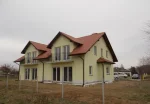Aktywne Wpisy

Wytłumaczcie mi czemu ludzie kupują szeregówki, albo bliźniaki.
Tyle jest tu naśmiewania się z patodeweloperki mieszkalnej, a nikt się nie śmieje z tych potworków typu yebnięty na środku pola, na zadupiu bliźniak, gdzie każdą połowę kupią obcy sobie ludzie i będą na siebie skazani w tej intymnej atmosferze, dużo bardziej niż w bloku mam wrażenie.
Pełno tego się nasrało ostatnimi czasy.
Jadę na takie zadupie do swojego dentysty i mijam coraz więcej
Tyle jest tu naśmiewania się z patodeweloperki mieszkalnej, a nikt się nie śmieje z tych potworków typu yebnięty na środku pola, na zadupiu bliźniak, gdzie każdą połowę kupią obcy sobie ludzie i będą na siebie skazani w tej intymnej atmosferze, dużo bardziej niż w bloku mam wrażenie.
Pełno tego się nasrało ostatnimi czasy.
Jadę na takie zadupie do swojego dentysty i mijam coraz więcej

źródło: dom bliźniak
Pobierz
patryqo +585
To jest normalne? U was też? Bo mi sie już pierodoli od tego #rownouprawnienie i nie wiem co jest normalne a co nie(╯°□°)╯︵ ┻━┻
#kiciochpyta #dzienkobiet #pracbaza #pieklokobiet
#kiciochpyta #dzienkobiet #pracbaza #pieklokobiet

źródło: Zdjęcie z biblioteki
Pobierz


Gibbs o szpitalu z czasów ofensywy pod Sommą:
We called the hospital at Corbie the "Butcher's Shop." It was in a pretty spot in that little town with a big church whose tall white towers looked down a broad sweep of the Somme, so that for miles they were a landmark behind the battlefields. Behind the lines during those first battles, but later, in 1918, when the enemy came nearly to the gates of Amiens, a stronghold of the Australians, who garrisoned it and sniped pigeons for their pots off the top of the towers, and took no great notice of "whizz-bangs" which broke through the roofs of cottages and barns. It was a safe, snug place in July of '16, but that Butcher's Shop at a corner of the square was not a pretty spot. After a visit there I had to wipe cold sweat from my forehead, and found myself trembling in a queer way. It was the medical officer—a colonel—who called it that name. "This is our Butcher's Shop," he said, cheerily. "Come and have a look at my cases. They're the worst possible; stomach wounds, compound fractures, and all that. We lop off limbs here all day long, and all night. You've no idea!"
I had no idea, but I did not wish to see its reality. The M.O. could not understand my reluctance to see his show. He put it down to my desire to save his time—and explained that he was going the rounds and would take it as a favor if I would walk with him. I yielded weakly, and cursed myself for not taking to flight. Yet, I argued, what men are brave enough to suffer I ought to have the courage to see... I saw and sickened.
These were the victims of "Victory" and the red fruit of war's harvest-fields. A new batch of "cases" had just arrived. More were being brought in on stretchers. They were laid down in rows on the floor-boards. The colonel bent down to some of them and drew their blankets back, and now and then felt a man's pulse. Most of them were unconscious, breathing with the hard snuffle of dying men. Their skin was already darkening to the death-tint, which is not white. They were all plastered with a gray clay and this mud on their faces was, in some cases, mixed with thick clots of blood, making a hard incrustation from scalp to chin.
In one long, narrow room there were about thirty beds, and in each bed lay a young British soldier, or part of a young British soldier. There was not much left of one of them. Both his legs had been amputated to the thigh, and both his arms to the shoulder-blades.
"Remarkable man, that," said the colonel. "Simply refuses to die. His vitality is so tremendous that it is putting up a terrific fight against mortality... There's another case of the same kind; one leg gone and the other going, and one arm. Deliberate refusal to give in. 'You're not going to kill me, doctor,' he said. 'I'm going to stick it through.' What spirit, eh?"
In bed after bed I saw men of ours, very young men, who had been lopped of limbs a few hours ago or a few minutes, some of them unconscious, some of them strangely and terribly conscious, with a look in their eyes as though staring at the death which sat near to them, and edged nearer.
"Come in again, any time!" shouted out the cheery colonel, waving his hand.
I refused that invitation. I walked stiffly out of the Butcher's Shop of Corbie past the man who had lost both arms and both legs, that vital trunk, past rows of men lying under blankets, past a stench of mud and blood and anesthetics, to the fresh air of the gateway, where a column of ambulances had just arrived with a new harvest from the fields of the Somme.
I never went again, though I saw many other Butcher's Shops in the years that followed, where there was a great carving of human flesh which was of our boyhood, while the old men directed their sacrifice, and the profiteers grew rich, and the fires of hate were stoked up at patriotic banquets and in editorial chairs.
#starszezwoje - tag ze starymi grafikami, miedziorytami, rysunkami z muzeów oraz fotografiami
#historia #fotohistoria #medycyna #iwojnaswiatowa #ksiazki #cytaty #myrmekochoria
źródło: comment_1614329807us9y8AGPhtv8ChUFGhLkuS.jpg
Pobierz